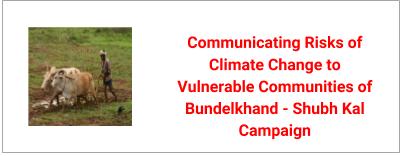(Article) Communicating Risks of Climate Change to Vulnerable Communities of Bundelkhand - Shubh Kal Campaign
(Article) Communicating Risks of Climate Change to Vulnerable
Communities of Bundelkhand - Shubh Kal Campaign
Eighteen out of the last thirty years of recurring and long droughts, attributed by meteorologists to climate change, are playing havoc with the lives of 21 million poor and marginalised people of Bundelkhand region in Central India. Most households have sold assets and stories of hundreds of farmers’ suicide due to starvation and debts abound in the local and national media. Others are forced to migrate to towns in search of food and livelihoods.
It is estimated that almost 6000 people are migrating from this region every day. India’s First National Communication to the UNFCCC and recent projections by the Indian Institute of Tropical Meteorology clearly show climatic changes (increased mean temperatures and reduction in precipitation) in the area, both in the last 30 years, as well as in the next 60 years. Assessments by the Indian Agriculture Research Institute, New Delhi have also shown that this will reduce yields of wheat, the prime staple crop, by up to 25 per cent.
This is likely to further exaggerate the existing problems of food and livelihood insecurity, poor health and migration along with breaking of social support systems. Communities clearly have a weak capacity to manage climate threats, as also highlighted by vulnerability assessments conducted by Development Alternatives at different times. Development Alternatives is working in the region for more than two decades and it has understood the need of the people, while realizing the urgency of communicating the risks of climate change to the vulnerable communities.
However, communities are sceptical and unwilling to change without knowing the benefits. They are at the receiving end and do not have the capacity to absorb concepts, which have long-term benefits. They need quick results with multiple benefits
Author: Soma Biswas
Source: Development Alternative Newsletter
